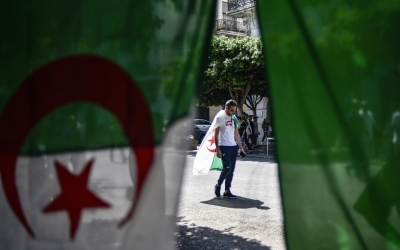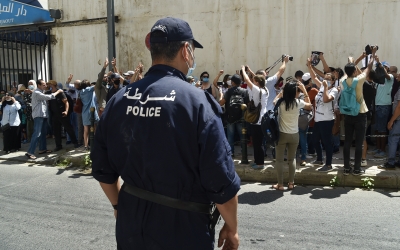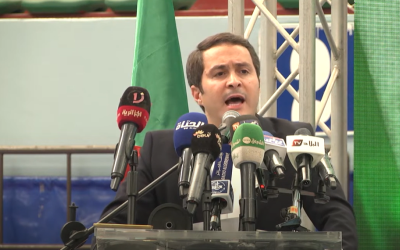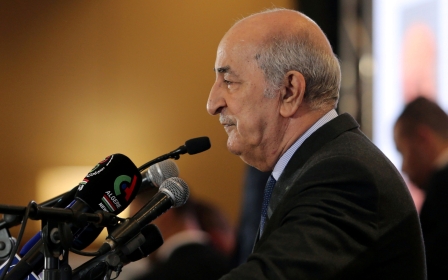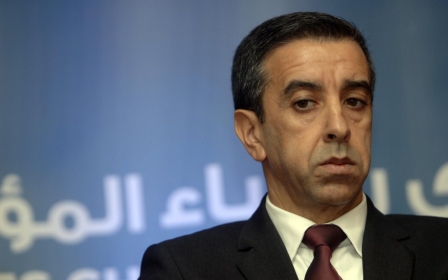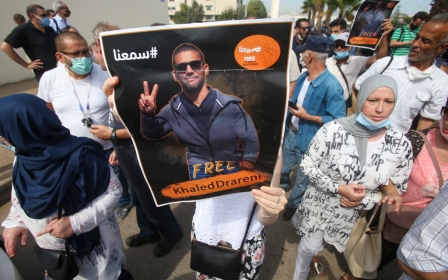A breakdown of Algeria's new constitution
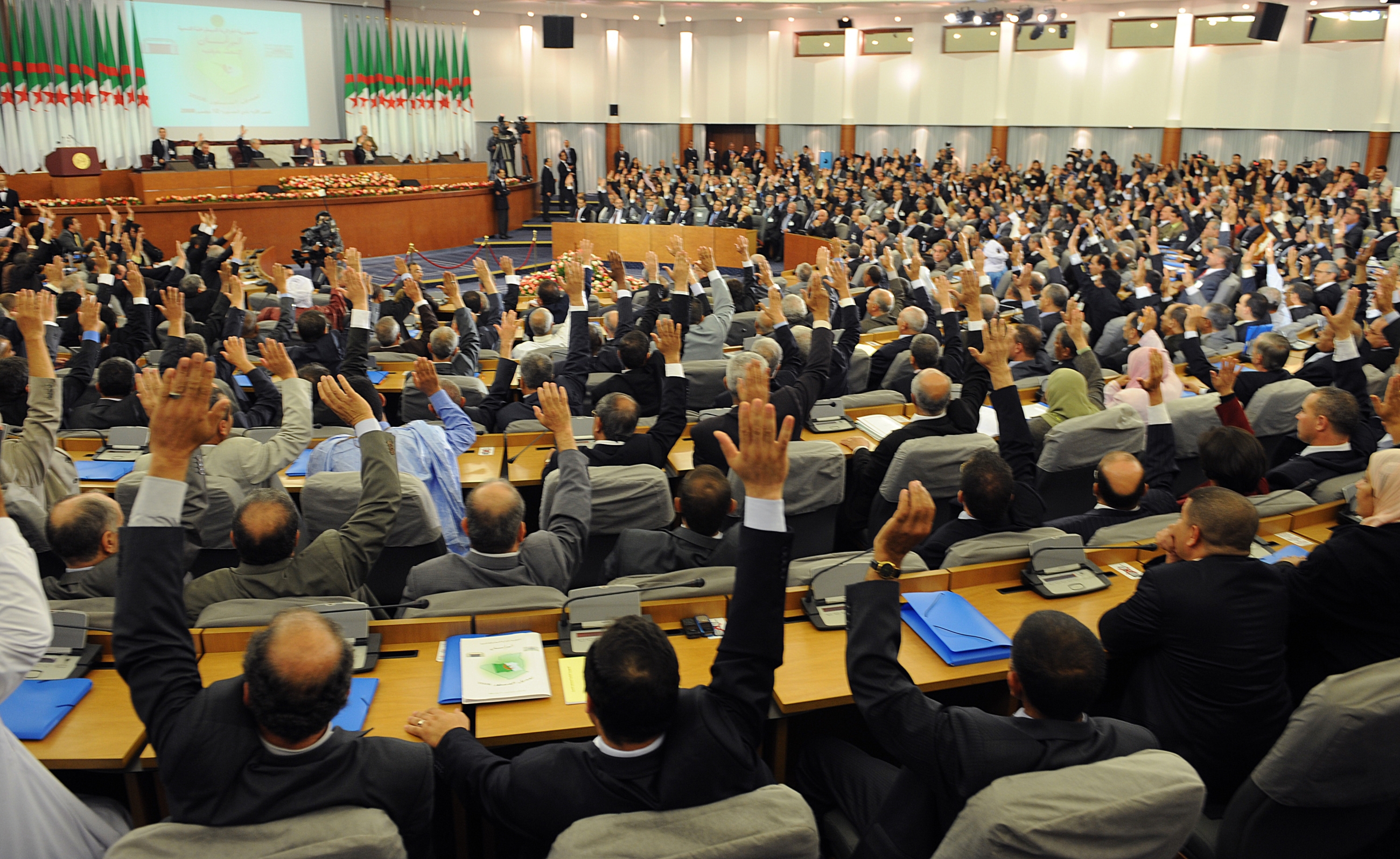
The campaign for Algeria's constitutional amendment bill got going on 7 October, with the slogan: "November 1954: Liberation. November 2020: Change." It was hoped the catchy phrase would convince Algerians to vote in the referendum on 1 November.
At his inauguration in December 2019, President Abdelmadjid Tebboune, whose current hospitalisation makes it doubtful whether he will be overseeing Sunday's vote, had pledged to revise the constitution. But he has been unable to convince the opposition, lawyers and ordinary frustrated Algerians of the sincerity of the proposals.
New MEE newsletter: Jerusalem Dispatch
Sign up to get the latest insights and analysis on Israel-Palestine, alongside Turkey Unpacked and other MEE newsletters
Back in January, a hand-picked committee of experts formulated proposals to revise the basic law within the space of three months. The first draft of the proposals was published on 7 May, having been postponed following the onset of the coronavirus pandemic.
Despite assurances that the constitutional proposals had been formulated on the foundations of a "modern state at the service of citizens" which would shape a "new Algeria", the authorities have prevented opponents of the referendum from campaigning and holding meetings in public spaces.
This clampdown contradicted earlier assurances from the president of the National Independent Authority for Elections, Mohamed Charfi, that anyone would be free to campaign, regardless of their position.
While the army is bound by the constitution to maintain neutrality, the acting head of the armed forces, General Said Chengriha, last week confirmed the support of the military - which holds the centre of power in the country - for the referendum, characterising it as "an important step in building a new Algeria".
Despite claims that the new constitution would broaden and consolidate democracy in Algeria, there have been calls to boycott the referendum by those who view the process as nothing more than a way for the regime to offset its crisis of legitimacy.
The calls mirror the boycott of the elections held in December 2019, in which Tebboune secured the presidency despite poor voter turnout.
With Algerians set to vote on Sunday, Middle East Eye takes a look at what is being proposed and how it compares with the country's history of constitutional amendments.
What are the proposals for a revised constitution?
The document submitted contains 73 recommendations, divided into six main areas. These include "strengthening the separation of powers" concerning the prerogatives of the president, the head of government and parliament, the judiciary, and the fight against corruption.
Under the proposed changes, Article 2, which enshrines Islam as the religion of the state, would remain, together with most of the constitution's "general principles" on issues such as democracy, plurality and social justice. Small changes are expected to be made around the issue of decentralisation, with certain municipalities operating under their own "special system". However, exactly how this would be achieved remains vague.
The most controversial component of the draft falls under proposed changes to Article 29, which relates to the role of the army. For the first time, the army can be deployed outside national territory to support international peacekeeping missions. It's a change believed to have been provoked by the situation in neighbouring Libya. The change in role has raised concerns over what the implications would be and how the military's place in society develops.
In relation to basic rights, the draft fails to significantly develop civil and political rights - the basis of popular democratic demands - and, unlike in Tunisia, the draft constitution lacks a limitations clause, resulting in no guidance on how rights could be limited.
The constitutional amendments have been presented as a way in which power will be better balanced in a bid to steer the country away from authoritarianism. However, the constitution still ensures extensive presidential power over government appointments, including the dismissal of the prime minister, delegating powers to the vice-president and authority over institutions.
One of the main changes in the draft is the introduction of a 30-day limit to a state of emergency, whereby any extension sought would need to be renewed by a joint parliamentary session.
Despite minor changes to the courts and judiciary, the president still maintains significant control over them. As head of the high judicial council, the president can still appoint its members, which is in direct contrast to claims the draft would ensure the separation of powers.
This is unlikely to dampen criticism of the state's influence in the trials of activists and journalists arrested in the crackdown on dissent. Nor is it likely to quell unease about what activists view as a score-settling campaign against influential members of former President Abdelaziz Bouteflika’s power circle.
Why is the date of 1 November significant?
Algeria’s war of independence against French colonial rule was declared on 1 November 1954 with the proclamation of the "restoration of the sovereign Algerian state" and "democratic and social rights within the framework of Islamic principles", as well as political pluralism and fundamental freedoms.
These calls were said to be instrumental in the formulation of the first constitution of the new Algerian state.
Since then, the ruling elite have often used their status as war veterans to legitimise their hold on power and that of the ruling party of the National Liberation Front (FLN), which has governed the country since independence.
As such, key dates in Algeria's history, such as Independence Day on 5 July, or the anniversary of the 1945 massacres of Algerians by French colonial authorities on 8 May, have often been marked by important announcements, such as the pardoning of political prisoners or, in the case of the 2019 popular protest movement known as the Hirak, mobilising in the spirit of change embodied by the country's revolutionary figures.
Key changes to Algeria's constitution over the years
Algeria has had a number of constitutional amendments. However, many of the reforms have met with criticism due to disparities between what was proposed and what ended up being implemented in terms of challenging long-standing social and political stagnation.
The country's first constitution, which implemented a one-party state led by the FLN, was suspended following the 1965 military coup d'état. In 1973, an amended constitution was introduced by Houari Boumedienne, Algeria's second president, which emphasised socialism and restored the independence of political institutions from military oversight.
There had been the potential for genuine and lasting reform following the Black October riots of 1988, which had been fuelled by economic and social grievances. Under the presidency of Chadli Bendjedid and the prime ministership of Mouloud Hamrouche, proposed reforms, drafted by Abderrahmane Hadj-Nacer, would have allowed Algerians a rare chance to shape their country's future.
'The Algerian regime is considering the referendum as a way out of the legitimacy crisis it has been stuck in since the massive rejection of the last presidential elections'
- Amel Boubekeur, European Council on Foreign Relations
However, the introduction of Algeria's first multi-party elections as part of constitutional reforms saw the military withdraw their support and cancel the elections after it became clear that the Islamic Salvation Front would win a majority. The military coup imposed a state of emergency, which suspended parts of the constitution.
The coup provoked a brutal civil war, which was used thereafter as justification by the ruling elite that any alternative to their system would see the country regress to the same depraved violence - the barrier of fear which analysts say was broken by 2019's uprising.
In 2008, Article 74, which limits presidents to two terms, was removed by Bouteflika to allow him to run for a third term in 2009. It was reinstated in the constitutional amendments of 2016, but did nothing to change the system of governance and did not prevent him from seeking a fifth presidential term. This was ultimately his political downfall as nationwide protests forced his resignation last year after 20 years in power.
The 2016 constitutional reforms promised increased roles for women and young people in the public and civic spheres and better assembly and press freedoms. Bouteflika's chief of staff at the time, Ahmed Ouyahia, promised the new constitution would strengthen freedoms and enshrine the separation of powers.
But with little progress since 2016, and much of 2020's draft constitutional reforms mirroring many previous reforms, it is unlikely that the state's roadmap of constitutional changes will modernise the outdated political system - the very thing that Algerians have been demanding.
The Hirak
The day after Tebboune’s election on 12 December 2019, the president expressed his desire to reach out to the Hirak - and promised a "profound" revision of the constitution, with a "new republic".
However, opponents rejected Tebboune's plan, criticising its top-down approach and its lack of input from those who best represented their political and social visions. The Algerian League for Human Rights, which documents the arbitrary arrests and incarcerations of Algerians, has denounced Sunday's vote as "a referendum of fait accompli".
According to critics, the draft's proposals are not significant enough to satisfy the widespread demands for deep reforms. Many Algerians have chosen to boycott the process, believing that it only seeks to secure the longevity of the regime and to placate civic opposition while preserving the government's balance of power.
Statements from public figures, such as the minister of youth and sports last week, who said that Algerians who disagreed with the referendum should "change country", have failed to instil hope in the proposed changes. Many Algerians remain unconvinced there is a future for them in the country.
Above all, opponents argue that the proposed constitutional amendments go nowhere near addressing the reforms sought by the Hirak, which has continually called for any solution to honour civic freedom and to adhere to articles seven and eight of the constitution, which enshrine the sovereignty of the people.
For many analysts, despite the desires expressed by Tebboune and his associates towards a "new Algeria", the lack of transparency of the process and the clampdown on opposition and dissent - meaning that the Hirak's views are being excluded and the result of the referendum somewhat predetermined - only reinforces the popular feeling that stagnation, injustice and the hold of the elite on political power continue to be rooted in Algerian life.
What the experts say:
• Dr Isabelle Werenfels, senior fellow at the German Institute for International and Security affairs
"For a new Algeria, I believe the changes are not profound enough. More importantly, it is not just the constitution, but its implementation that matters - and here practices would need to change strongly. What we see today with regard to freedom of expression does not testify to independence of the justice system. The key question is: is there a political will of decision makers for a new Algeria? The top-down way the constitution was elaborated and the way the campaign for the referendum is run puts strong question marks regarding this will."
• Dr Karim Mezran, resident senior fellow at the Atlantic Council
"I don't believe that amendments to a constitution or even a new constitution itself can provide a stable and dynamic environment for democracy to be realised. In this particular case, it is evident that the amendments are instrumental for the elites to maintain control of the country while appearing as meeting the demands of the opposition, as well as the large part of the population. Nevertheless, the simple fact that the elite has been forced to act in the direction of orchestrating this show is a good step forward. This means that the failure or the success of the referendum is irrelevant. Since democratisation is a process made by many steps forward towards its full adoption, all we can say for the moment is that Algeria is moving in the right direction, albeit very slowly."
• Dr Yahia Zoubir, non-resident fellow at the Brookings Doha Centre
"The problem in Algeria is not the constitution, of which Algeria has had plenty. The 'new Algeria' requires genuine reforms and good governance. Organising a referendum on the new constitution on 1 November, the anniversary of the beginning of the launch of the war of independence in 1954, is a not-so subtle attempt by the political system to regain historical legitimacy, which it has lost many years ago."
• Dr Dalia Ghanem, resident scholar at the Carnegie Middle East Centre
"First, it should be said that the amendment of the constitution was not a demand of the Hirak. Second, the way in which these amendments have been decided, lacking transparency and dialogue but also taking place in a repressive environment with dozens of arrests, does not show signs of the development of a 'new Algeria'. Finally, on 1 November, the Hirak will prove its mobilisation potential and all that we can do for now is wait and see."
• Amel Boubekeur, visiting fellow at the European Council on Foreign Relations
"The Algerian regime is considering the referendum as a way out of the legitimacy crisis it has been stuck in since the massive rejection of the last presidential elections. The reality is that the way it is reinforcing the military and securitarian management of civil affairs will increase even more the gap between them and the Hirak, which is now no more considering the Algerian government as a solid partner to consider a democratic transition. Algerians as a whole are also presented with a constitution that is in fact solving the problems for the regime and its need to restructure itself after Bouteflika, while what they are asking more is primarily to be provided with concrete solutions to the scarcity of job opportunities and the crumbling of public services like education and health."
Middle East Eye delivers independent and unrivalled coverage and analysis of the Middle East, North Africa and beyond. To learn more about republishing this content and the associated fees, please fill out this form. More about MEE can be found here.


